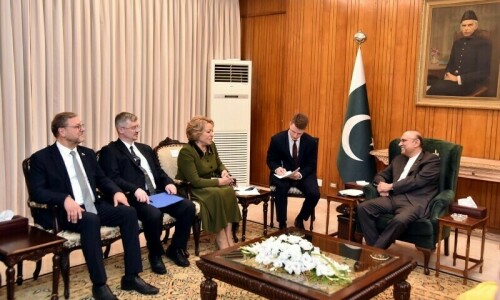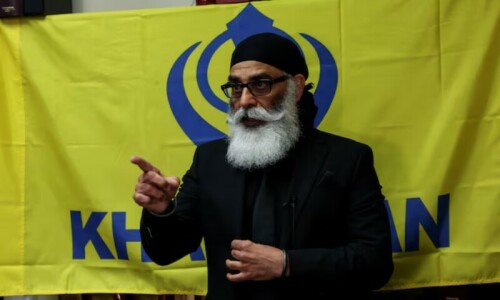
DOHA: Beyond the rising facade of a modern skyline, down dusty roads lined with old car wreckages, lies Doha’s industrial area. It is here where the mirage of the rich, rapidly developing, and regal state of Qatar dissolves in the heat.
“I have not been paid for five months,” said Hadees Ansari, from Nepal. “I wanted to go back home but they did not return my passport. They also stopped paying me. Now I have no money but because I don’t have my passport, I cannot go back home.”
Most immigrant workers in Doha are from India, Nepal, and Pakistan. The moment these workers get to Qatar, their passports are held by the companies they work for. Ansari said he has been trying to get his case resolved for the last five months. According to Ansari, the case moved from the Nepali Embassy to the Labour Court, and is now currently at the Supreme Court. Meanwhile Ansari said he has no money to eat or to send back home.
“Sometimes my friends give me food. Other times, I stay hungry,” Ansari said
This is one of many stories that labourers in Doha’s industrial area have to share. They crowded around to tell their tales when they were approached in the area’s local marketplace. All of them have paid large sums of money to agents in their home country to come to Qatar. They said they were promised pay increases and benefits. But the reality appears to be very different.
Islam Khan, from Delhi, said the labourers only had contact with the supervisors of their companies. In most cases these supervisors are not Qatari but they have been sponsored by a Qatari in order to set-up and operate their businesses. In Qatar, 51 per cent of all businesses and property must be owned by a Qatari in all circumstances.
“This is causing us intense suffering,” Islam Khan said.
Ram Yadav from Nepal is another example of how the existing system in Qatar is not focusing on labour issues. He came to Doha on a one-year contract but was let go by his company in eight months.
“They did not give me any extra pay when they told me to go in eight months,” said Yadav. “I got a job at another company but they needed 2000 Riyals (about $660) for the transfer papers.
Yadav had to borrow money from a friend to continue his job. This is in addition to the money he paid earlier to get the first contract to come to Qatar. According to a local guide, average monthly pay for labour in Doha’s industial area is between $200 and $500 a month. The low pay also means none of them have their families with them because according to the rules in Qatar, families of workers with a pay less than 5000 Riyals ($1388) a month are not allowed.
Crowding around and trying to get their story in, the workers complained of having no health benefits even though each one of them said it was part of the contract they had agreed to. There were no clinics and hospitals close to the industrial area where they live and work.
“They said this was a one-year contract with food and health benefits. But when I reached here, I found that it was a two-year contract and there is no food, no overtime and no health benefits,” Ankush Kumar from India said. “We even have to pay for the gas we use to cook our food.”
Qatar is a country rich in natural gas, standing number three in proven gas reserves. Electricity, gas and other utilities are free for Qataris. But the same is not true for non-Qataris who make up a large percentage of this small country. Of Qatar’s nearly one million people, only 0.2 million are Qataris.
Aiknath Adikani, from Nepal, has been working for a local company for five years without a pay increase.
“I was already a mechanic when I came to Qatar but they put me in the unskilled labour category because of which I get paid 500 Riyals ($140) a month. Even today, my pay hasn’t increased. Instead, they sometimes add extra allowances,” Adikani said.
With a low pay to begin with and no pay increases to hope for, many workers find it hard to get by. They say they do not have enough to send back to their families because they are strictly prohibited from working outside their contract.
Jamshed Alam from Bangladesh made the mistake of finding a part-time job. He was arrested by Qatari authorities and had to pay 26,000 ($7200) Riyals to get out of jail. Companies and individuals who allow their workers to get part-time positions can also get into trouble. They may have to pay fines of 50,000 Riyals ($13,900) and can be arrested.
According to a Pakistani-Canadian legal worker now living in Qatar, labour conditions vary from company to company.
“Some companies are better than others in how they treat their labour,” she said. “But in some places the conditions are really very bad.”
The name of the legal worker has been omitted on purpose to avoid any possible trouble. That is because a very strict sense of what you can do and what you cannot do pervades Doha. Secret service seems to be monitoring the city closely. They appeared to investigate what was going on the moment they noticed a crowd in the market.
And they have a lot of work to do before 2022 when the FIFA World Cup comes to Qatar. Construction and development projects are continuing all around Doha and word is that even the industrial workers will be fitted in somewhere to complete the perfect picture of modern Doha.













































